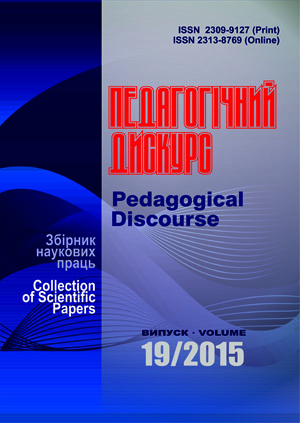Promoting School Childrenʼs Environmental Activities in Junior Eco-club in Japan
Abstract
This article is dedicated to promoting activities of Junior Eco-Clubs in Japan since 1995 – the beginning of the Japan Environment Agencyʼs project «Junior Eco Club» as a non-formal environmental education. The support and the role of the environmental education in the Japanese government legal acts are represented. The fostering of childrenʼs awareness on environmental issues, building a sustainable society that will have less environmental stress in the 21st century, and providing support for youth who will be responsible for shouldering the next generations as the main purpose of Junior Eco-Club activities are represented. Club registration, choice of directions, types and forms of eco-clubs activities, the role of coordinators and supporters, logistic support, information about eco-club activities and exchange of success experience between the eco-clubs are shown. Particularly the substances of two main types of environmental activities called «ecological action» and «ecological training» are revealed.
The participation of local governments/ municipalities, NGOs, citizens in the promotion of exploration and conservation of nature environment, the effort to foster studentsʼ aspiration to participate in environmental activities and to maintain lifestyles with low environmental impact are reported. The role of Japan Environment Association as the national secretariat for the Junior Eco-Club is shown. The article also emphasizes the necessity the communities and authorities support of the outdoor education in Eco-club activities. The article explaines the ways of training supporters, involvement the volunteers with experience in the field of environmental protection and education for childrenʼs activity in eco-clubs. The relation between the Junior Eco-club program of the Ministry of the Environment and the Ministry of Education, Culture, Sports, Science and Technology is deduced. Voluntary work of all project participants is marked. The dynamics of the number of eco-clubs and their members in Japan for the last 20 years are shown. The importance of close coordination of junior eco-club activities with local schools in the future is mentioned in the article.
Downloads
References
Junior Eco-Club Wins Global 500 Award [Електронний ресурс]: Kids WEB Japan. – Режим доступу: http://intranet.puhinui.school.nz/Topics/AsianCountries/KidswebJapan/ecokids/clubs/g500.html / Junior Eco-Club Wins Global 500 Award [Elektronnyy resurs]: Kids WEB Japan. - Rezhym dostupu: http://intranet.puhinui.school.nz/Topics/AsianCountries/KidswebJapan/ecokids/clubs/g500.html [in English]
Masahiro Takahashi Junior Eco-Club Research Associate, Environmental Education Project, Institute for Global Environmental Strategy (IGES) Режим доступу до документу: http://pub.iges.or.jp/modules/envirolib/upload/1520/attach/Japan.pdf / Masahiro Takahashi Junior Eco-Club Research Associate, Environmental Education Project, Institute for Global Environmental Strategy (IGES) Rezhym dostupu do dokumentu: http://pub.iges.or.jp/modules/envirolib/upload/1520/attach/Japan.pdf [in English]
Kilkistʼ eko-klubiv ta chleniv eko-klubiv v Yaponii po rokah. (Number of Eco-Clubs and Members of Eco-Clubs in Japan by the Years) [Elektronnyy resurs]: Dytiachi eko-kluby / Asotsiatsiia z navkolyshnʼoho seredovyshcha Yaponii. – Rezhym dostupu: http://www.j-ecoclub.jp/common/files/number_past_h25.pdf [in Ukrainian]
Dytiachyy eko-klub [Elektronnyy resurs]: Asotsiatsiia z navkolyshnʼoho seredovyshcha Yaponii (Eco-Club for Children)- Rezhym dostupu:http://www.j-ecoclub.jp/ecoreport/list.php [in Ukrainian]
Promoting Extra-curricular Learning Through Junior Eco-Clubs: Asia-Pacific Environmental Innovation Strategies (APEIS), Research on Innovative and Strategic Policy Options (RISPO)/ – Режим доступу до документу: http://pub.iges.or.jp/contents/APEIS/RISPO/inventory/db/pdf/0119.pdf / Promoting Extra-curricular Learning Through Junior Eco-Clubs: Asia-Pacific Environmental Innovation Strategies (APEIS), Research on Innovative and Strategic Policy Options (RISPO)/ - Rezhym dostupu do dokumentu: http://pub.iges.or.jp/contents/APEIS/RISPO/inventory/db/pdf/0119.pdf [in English]
The 2nd Junior Eco-Club Asia Conference, Meeting of Governmental Officials/NGOs [Електронний ресурс]: Ministry of the Environment/ – Режим доступу: http://www.env.go.jp/en/policy/edu/junior/summary2.html / The 2nd Junior Eco-Club Asia Conference, Meeting of Governmental Officials/NGOs [Elektronnyy resurs]: Ministry of the Environment/ – Rezhym dostupu: http://www.env.go.jp/en/policy/edu/junior/summary2.html [in English]

















